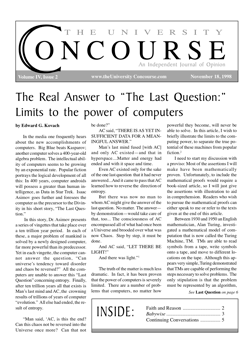Faith and Reason
by Kathleen van Schaijik
The new papal encyclical, Fides et Ratio, has lots to say to Franciscan University. A semester seldom goes by without some of our students asking in one way or another the question: “What does intellectual discourse have to do with a personal relationship with Jesus Christ?” And, generally speaking, the question is raised not interrogatively, but rhetorically—as if the obvious answer were “nothing at all.”1
The Concourse has several times received letters from readers who were concerned that the discussions featured in our pages—and the intra-university disagreements they sometimes times uncover—were alarming indications that FUS is losing focus. All that matters, these earnest readers wanted to stress, is that we love Jesus and our neighbor. Arguments have no place.
As ignorant and provoking as this line of thinking may be (especially when found at a university), it will not surprise or dismay us over much, if we consider the special spiritual affinity Franciscan University feels with the early church. The encyclical reminds us that it took the Church some generations before she fully grasped the indispensable importance of the intellectual life for the Faith. The Pope writes:
“The practice of philosophy and attendance at philosophical schools seemed to the first Christians more of a disturbance than an opportunity. For them, the first and most urgent task was the proclamation of the Risen Christ by way of a personal encounter which would bring the listener to conversion of heart and the request of Baptism…The encounter with the Gospel offered such a satisfying answer to the hitherto unresolved question of life’s meaning that delving into the philosophers seemed to them something remote and in some ways outmoded” (38).
This expresses exactly the position of many of our students and staff members. They are living in vivid consciousness of the life-changing grace of their own conversions, and are filled with an over-powering zeal to spread the word of God’s merciful love. In the light of their evangelistic ardor, learned and minute disputes about liturgical correctness or education philosophies look worse than irrelevant; they look positively destructive; they seem to represent a turning away from God and a breakdown of charity.
So, recognizing that it comes out of an authentic religious experience, we should try hard to respond to those laboring under this misconception with patience and understanding. But, at the same time, we should carefully and constantly teach them that, all its resemblance to the enthusiasm of the first Christians notwithstanding, this way of thinking does not represent the mind of the Church today.
So far from shifting emphasis away from academics in favor of preaching and mercy works, the whole encyclical could be summarized as an urgent call on the Church to foster a deeper, more rigorous and more reflective intellectual life in her members, and a warning against the danger of thinking that faith can dispense with right reason.2 Consider the following lines, which might almost have been written with evangelicals and charismatics (who have a tendency to undervalue the intellectual life) in mind:
“Deprived of reason, faith has stressed feeling and experience, and so run the risk of no longer being a universal proposition. It is an illusion to think that faith, tied to weak reasoning might be more penetrating; on the contrary, faith then runs the grave risk of withering into myth or superstition…The parrhesia of faith must be matched by the boldness of reason” (48).
The Church began with the Pentecost, but it didn’t stop there; the Patristic period followed. Similarly, the grace of renewal experienced twenty years ago at FUS is beginning to issue into a lively intellectual life. If we take our lead from the Pope, we will do everything in our power to encourage that development.
Kathleen van Schaijik
- For an excellent discussion of this point see check our website for Regina Schmiedicke’s Vol.I, issue 7/8 article “Making ‘the connection:’ a Steubenville education.” ↑
- Fides et Ratio also takes to task thinkers who pursue intellectual work without reference to faith. But I think we can gratefully say that that is not the particular danger threatening FUS. ↑


